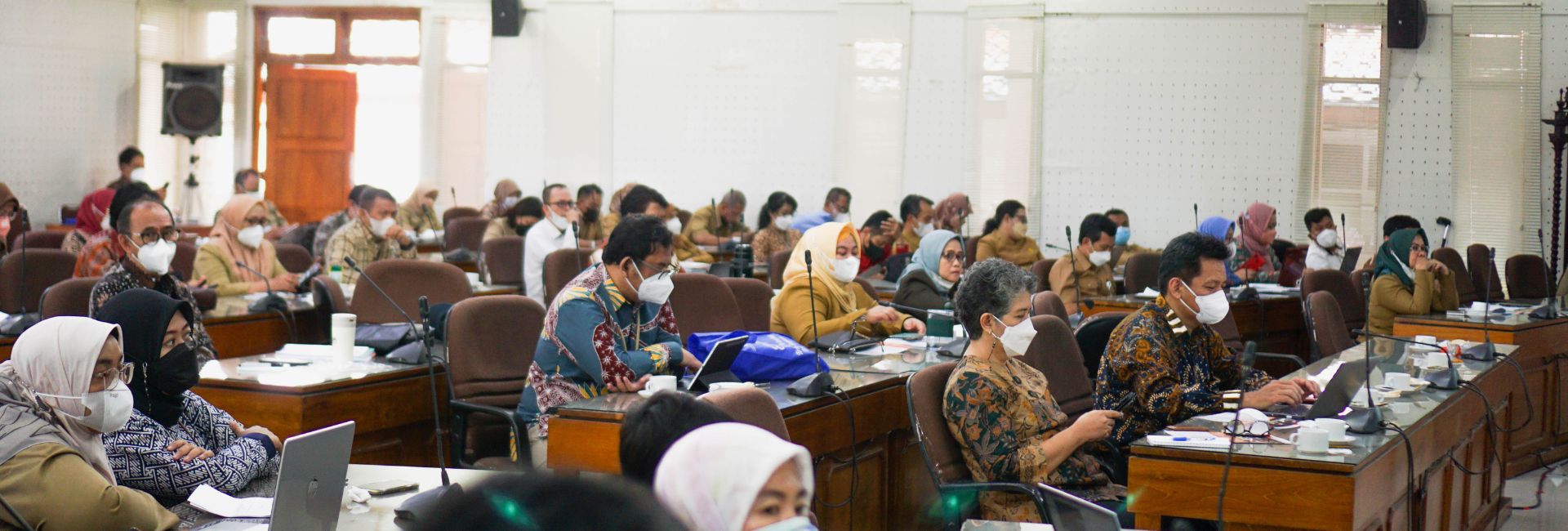.
The Indonesian version of this article was originally posted on the Knowledge Sector Initiative website and has been translated by the SMERU team.
.
The SMERU Research Institute is an organization for research and policy studies that focuses on socioeconomic issues urgent for the Indonesian people. Since its establishment in 2001, SMERU has consistently committed itself to the area of research and refrained from being involved directly in public policy advocacy. In particular, SMERU has never attempted to ensure that its research findings are considered in the formulation of public policy. In some cases, several changes in public policies were consistent with SMERU’s research recommendations. However, SMERU could never claim that its studies had contributed to those changes.
Until 2011, SMERU’s policy engagement with public policymakers was indirect. Generally, SMERU carried it out by disseminating its research findings through online media (website), printing and distributing its research reports, and organizing seminars; and through formal and informal communications with policymakers. The advantage of this approach is that the researchers do not have to bother with issues other than research that may be time-consuming. The disadvantage, however, is that the research findings might fail to reach policymakers and, eventually, fail to influence the policy products.
SMERU’s persistence to refrain from being directly involved in policymaking has resulted in less optimal influence its research has on the policies made. It was argued that the contribution could have been more optimal if SMERU had been actively engaged in policy advocacy. Nevertheless, advocating a policy does not necessarily mean to be frontal in doing it by using various forms of pressure to make the proposed policy agenda accepted by policymakers.
***
Since 2011, SMERU has been directly involved in formulating several important policies related to poverty reduction. The approach of building both formal and informal relations with policymakers was found to be highly effective to influence a policy. This experience led SMERU to its subsequent attempt to build good relations with many policymakers at ministries and institutions. SMERU strove to avoid frontal approaches in proposing its recommendations for public policy improvement.
One of the methods that provides vast room for making sure that research results will be considered in the making of a policy is to collaborate directly with the policymakers. However, there is only a small chance for such a situation to happen. For a greater chance to have this kind of situation, a research institute needs to be really credible and have very good relations with the policymakers. From the policymakers’ point of view, involving a highly credible institute in making their policies will improve the policy product itself.
In 2011, the rare chance came to SMERU. The National Development Planning Agency (Bappenas) invited SMERU to be involved in formulating the white paper for poverty reduction, namely the Master Plan for the Acceleration and Expansion of Poverty Reduction in Indonesia (MP3KI). There were at least two reasons behind Bappenas’ invitation to involve SMERU in formulating the policy: (i) Bappenas believed that SMERU had adequate knowledge of poverty reduction issues and (ii) SMERU had good relations with Bappenas, especially with the Director’s Office of Poverty Alleviation and Community Empowerment.
The partnership was special particularly since it was SMERU instead of international organizations—as in the case of a similar document, namely the Master Plan for the Acceleration and Expansion of Indonesia’s Economic Growth (MP3EI), drafted by the Coordinating Ministry of Economic Affairs—that Bappenas invited to help them with developing the document. At the initial process of the MP3KI drafting, many international donors offered their funds and experts to assist Bappenas. Nevertheless, Bappenas insisted that the document be prepared by SMERU, without any assistance from any other expert.
***
Substantially, MP3KI produced three main strategies to reduce poverty, namely even distribution of the fulfillment and improvement of basic services quality, comprehensive social protection, and development of sustainable livelihood. Unfortunately, this document did not obtain a legal status to be the general guideline for poverty reduction as that in the case of MP3EI. This was because of the brief interval between the MP3KI document completion and the end of the Susilo Bambang Yudhoyono Administration. Nevertheless, the Joko Widodo Administration accommodated the main strategies in MP3KI into a more strategic document, that is, the National Medium-Term Development Plan (RPJMN) 2014–2019.
Developing a strategic document such as MP3KI is never an easy job. During the process, SMERU faced many challenges. Some of them could be easily tackled since they had something to do with technical issues about data and analyses. For example, detailed data on people’s livelihoods were unavailable. To deal with it, the analyses in MP3KI used secondary data from Statistics Indonesia (BPS) as a proxy. Some others, however, were harder to tackle since they were associated with the political economy of policies, which has to take into account a range of issues beyond scientific knowledge. An example of this was the varied interests between ministries/agencies in relation to some important concepts in the draft. Thanks to the mutual trust as well as intensive and productive communications with Bappenas through, among others, regular formal meetings and informal discussions, everything could be handled well. During the process of developing MP3KI, SMERU threw all of its resources into accomplishing the task. Nearly 30 of its researchers were practically engaged in various stages of the MP3KI concept and document development.
SMERU’s involvement in assisting the government to develop a wide range of innovative policies for poverty reduction did not stop at the MP3KI concept formulation. In 2013, Bappenas offered SMERU another golden chance. This time Bappenas invited SMERU to get involved in making MP3KI’s concept of Sustainable Livelihood an operational program. This project was aimed at ensuring that (i) the concept of sustainable livelihood development approach that could be referred to by ministries and agencies was prepared and (ii) a program design for sustainable livelihood development was available and ready to be implemented by one ministry. In response to this invitation, SMERU gladly accepted it. This was because accepting it would allow SMERU to translate the abstract concept of MP3KI into a more operational program.
In this project, SMERU was involved in the stages of basic concept designing, discussion process involving ministries and institutions, and the piloting of the program design in the field. During the concept designing, SMERU was responsible for formulating a kind of “ideal formula”. This formula was then discussed with relevant ministries/institutions and donors, as well as implementers of various programs. During this process, extensive negotiations were carried out since each party had their own knowledge, experience, and even interests, all of which were asked to be incorporated into the design of program approach and implementation.
The many parties involved in the discussion made it even more important not only for exploring input to make the design substance better. The more important part of it was to seek—from all parties—legitimacy and acceptance of the program design. Such a mechanism is really important in the practice of public policymaking in Indonesia. The reason for this is that if a cross-ministerial program is prepared by only one ministry, support from relevant sectors for the program will not be optimal.
The attempt then came to fruition. First, a design for sustainable livelihood development approach, which was named exactly the same—Sustainable Livelihood Development (P2B)—and served as a platform for efforts to develop the livelihoods of poor households, was in place. Second, a more technical program design, which was subsequently referred to as the Community Empowerment-Based Improvement of Household Welfare (PKKPM) program and implemented by the Ministry of Villages, Development of Disadvantaged Regions, and Transmigration (the Ministry of Villages), was prepared. The P2B approach had been adopted by five ministries and had been implemented in the budget year of 2015–2016. Unfortunately, the pilot program for this approach, namely PKKPM, was halted by the Ministry of Villages. One of the reasons for this was the new budget policy that had made them change the budget allocations for their programs.
During the PKKPM pilot, SMERU was also involved in both the program implementation and its monitoring and evaluation (M&E). Such a condition may be considered unusual since it can put the objectivity of the program implementation in jeopardy. In its implementation, however, SMERU established two separate teams to allow them to walk hand-in-hand without each team’s objectivity being reduced. The very existence of two teams surprisingly improved the effectiveness of the program implementation. The M&E team could provide real-time input to the program implementing team. Within the two years of the PKKPM piloting, many revisions had been made to the program concept and implementation. Some of them were related to changes in the operation technical guidelines (PTO), an increase in the number of facilitators at kecamatan (subdistrict) level, changes in the mechanism for facilitator training, changes in the mechanism for disseminating information, and changes in the concept of and the mechanism for regional economic potential mapping.
***
SMERU's direct involvement in assisting the government to formulate public policies eventually brought about changes to how SMERU and the government work. For SMERU, the opportunities had given its researchers a chance to get a grasp of many technical aspects of how a good policy was developed. For example, SMERU’s researchers have learned that there is surely a political economy element in a project to design a development program. In this perspective, many of what seem to be scientifically ideal are not politically “marketable” or are impractical for a program implementation. An example of this was sustainable group facilitation by local NGOs at the government’s expense. SMERU also learned that while developing a program, government institutions even needed to conduct a lot of negotiations between themselves.
Therefore, even if a policy/program design is not optimal, sometimes it is politically acceptable to many government institutions. The two things are equally important. Without them, a program cannot be carried out. Understanding this fact, SMERU is now more cautious about providing policy recommendations. While previous recommendations would be formulated merely by logical inference from data analysis result, having better understanding of the political economy of a policy allows SMERU to be “wiser”. SMERU will always ask itself whether a recommendation will be practicable under existing circumstances. This lesson enables SMERU to provide more practicable policy recommendations rather than the seemingly ideal ones on paper. For example, in the case of village facilitation recommendation, SMERU did not hastily propose a facilitation mechanism based on local characteristics. This was because such facilitation required facilitators with a reliable ability, the personnel of which were not adequately available.
SMERU's involvement in the formulation of the government’s strategic policies has been made possible because since the reform era, some ministries/institutions have welcome those beyond the government to play some role. It was, thus, not a coincidence that Bappenas willingly invited SMERU to assist them in developing a flagship document and program. Bappenas has learned that local research institutions also have what it takes to do it if enough trust and chance are given. While, previously many international organizations would be involved in various government programs, currently it seems that more domestic organizations are employed by the government. Furthermore, it seems that the government institutions, such as Bappenas and some other ministries, have been more enthusiastic to talk about the importance of evidence in designing a policy.
The fact that the government more frequently asks research institutions to conduct policy research is an indication of the increasingly higher commitment from the government to evidence as the basis for their policymaking. An example of this is that in the implementation of Village Law, the government collaborated with a number of research institutions under the Village Working Group consisting of, among others, SMERU, Sajogyo Institute, Akatiga, Article 33, and SurveyMETER to provide the latest evidence of the practices of Village Law implementation. Such a commitment will eventually prove highly helpful for the process of creating increasingly better policies in the future.





